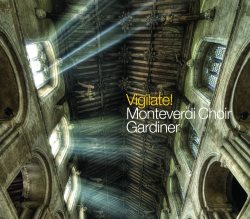| 
|
Vigilate! - English polyphony in dangerous times
Peter PHILIPS (c.1561-1628)
Ecce vicit Leo [2:24]
Robert WHITE (1538-1574)
Christe qui lux es et dies [3:38]
Thomas TALLIS (c.1505-1585)
Suscipe quaeso Domine [10:09]
O nata lux de lumine [1:46]
William BYRD (c.1540-1623)
Laudibus in sanctis [4:06]
Civitas sancti tui [5:27]
Turn our captivity, O Lord [4:19]
Nunc dimittis [8:43]
Vigilate [4:08]
Thomas MORLEY (c.1558-1602)
Nolo mortem peccatoris [2:52]
Robert WHITE
Lamentations for six voices [19:28]
William BYRD
Justorum animae [3:18]
Thomas TOMKINS (1572-1656)
Almighty God, the fountain of all wisdom [7:12]
Monteverdi Choir/Sir John Eliot Gardiner
rec. 11-15 June 2013, St. Giles’ Cripplegate, London.
Latin texts, English, French, German translations included
SOLI DEO GLORIA SDG 720 [77:23]
This disc forms part of the celebrations of the fiftieth anniversary of the Monteverdi Choir which gave its first concert in March 1964. Sir John Eliot Gardiner leads the choir in repertoire with which, to the best of my knowledge, they have not been greatly associated in recent years on disc. That said, judging by Gardiner’s introductory note they’ve been performing these and other similar pieces in concert. For this programme the Monteverdi Choir consists of 27 singers (9/6/6/6), though I’m not sure if all the singers take part in every piece. However, the ensemble is larger than, say, The Tallis Scholars or The Sixteen.
As Kerry McCarthy points out in the very interesting booklet note, many of the composers here represented formed part of a chain of tradition: Tallis taught Byrd who, in turn, had Morley, Philips and Tomkins as pupils at various times. However, what unites them just as strongly, it seems to me, is that all of them lived in very turbulent times when it could be very dangerous to find yourself on the wrong side of the Catholic/Protestant religious divide. Even Thomas Tomkins was not immune from this risk even though he lived much later than the other composers. His long reign as Organist of Worcester Cathedral was brought to a very abrupt end when, during the English Civil War, the Puritan forces occupied the city and forcibly did away with liturgical music.
So perhaps it’s not surprising that much English religious music of this period should be quite intense in nature and that intensity is brought out frequently here. The performances are often very different from what one might expect from, say, the Tallis Scholars. For example, Robert White’s Christe qui lux es et dies alternates verses sung to chant and verses where the chant is embroidered with polyphony. Given the derivation from chant some listeners may feel that the singing is a bit too moulded for comfort. Others again might feel that this moulding imparts a welcome expressiveness to the music. I’d incline towards the former viewpoint though I find much to admire in this expertly controlled performance. Incidentally, I believe that White composed several settings of this same text but we’re not told which one is performed here.
White composed two sets of Lamentations: one in five parts and another in six. It’s the six-part setting that’s offered here and mightily impressive it is, both as a composition and as a performance. White set six verses – verses 8 to 13 – from the first chapter of the Book of Lamentations. There’s a good deal of variety in the music for each verse and in this performance textural variety is shrewdly used too with solo voices being used for verse four and two solo voices at the start of verse five. This is imposing and eloquent music and Gardiner and his choir perform it marvellously.
At the very start of the programme the music of Peter Philips’ Ecce vicit Leo bursts forth exuberantly, the singing full of vitality. The Monteverdi Choir imparts a terrific spring to the rhythms, especially on the word ‘Alleluia’ which is repeated many times towards the end. There’s similar liveliness in Byrd’s Laudibus in sanctis. Kerry McCarthy describes this as ‘a romp through Psalm 150’ and that’s what it sounds like. Words and notes tumble over one another in this exciting performance yet clarity is never lost. Some may find this style of performance too extrovert for music of this period and I can imagine the way in which words are stressed and accented in the Tallis Suscipe quaeso Domine might cause the same people’s eyebrows to rise. I must admit that I wonder if the words aren’t over-emphasised a little in that Tallis piece but there’s no denying that it’s an arresting performance of this penitential music.
Gardiner leads a beautifully sing account of Byrd’s heartfelt Civitas sancti tui and Turn our captivity, O Lord is equally eloquent until the last line of the text is reached. Here the words ’they shall come with jollity’ are strongly articulated – the rhythms tight and crisp – to emphasise the change of mood. Byrd’s Justorum animae is an exquisite composition and it’s placed near the end of the programme. The performance here is as perfectly calibrated as the music. It falls to Thomas Tomkins to close the programme. Sir John, in a brief note, says of Almighty God, the fountain of all wisdom that it ‘describes the final drawing of the curtains on Elizabethan music.’ Perhaps that’s why he makes Tomkins’ complex music for the concluding ‘Amen’ so intense and expressive.
As I’ve said, this set of performances offers a different perspective on this music compared to what one would experience from hearing a smaller consort sing it. I welcome both approaches and I find Gardiner and his superb choir are very persuasive and stimulating guides to this repertoire. The recordings, engineered by Floating Earth, are excellent, as is the documentation – always a strength of this label. The wonderful cover image of part of the nave roof in Wymondham Abbey, Norfolk, which dates from c 1445, is a further attraction.
John Quinn
 |
 |
|



 All Nimbus reviews
All Nimbus reviews








